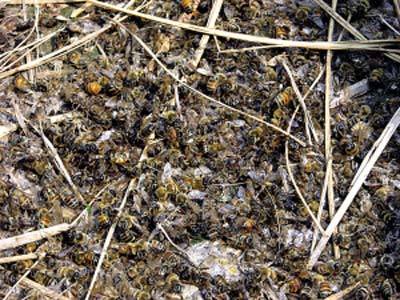Beekeepers in Shixing County in southern China's Guangdong Province are facing an unknown menace that is threatening to wipe out their bees and their livelihoods.
 |
|
Heaps of dead bees |
At the start of this year Lu Chunguang had 40 hives and about 2.4 million honeybees. But in early July he noticed something strange. "Every morning, at about eight, the bees would fly out of their hives. Some of the bees wobbled, then circled around and dropped dead," said the farmer who has lost ten hives and almost a quarter of his bees in the last three months. "The abdomens of the dead bees were stiff and swollen."
Beekeepers across the county have been experiencing similar or even greater losses. "This has been happening every year ever since 2004, but it's getting worse and worse," said He Yanbin, president of the Shixing County Beekeepers Association. "81 beekeepers lost 2000 hives worth 750,000 yuan (US$110,000) last year alone."
The local keepers say bees usually start dying in July and the problem continues until the following February. They say the worst affected areas are villages and towns bordering urban areas.
They suspect the threat may come from food, but their bees generally collect nectar from harmless eucalyptus and there is no evidence that flowers or grass have been poisoned.
They asked apiarists in nearby cities for advice, but could find nobody who had encountered such a crisis. Desperate keepers have tried all sorts of possible solutions such as hand feeding the bees on pollen, and dosing them with antibiotics and antidotes to common poisons, but nothing seems to work.
With many beekeepers solely reliant on their hives to make a living, the loss of such a large part of the bee population is a matter of grave concern. A number of bee experts have begun to investigate the crisis.
Luo Yuexiong, director of the Guangdong Insect Academy, said the dead bees were mainly Italian bees that may have difficulty adjusting to the local environment. He said the reason for the deaths probably lies in the bee's diet, some kind of bee disease, or the abnormal climate in recent years. But he added that more research needs to be carried out.
In the meantime, the experts told the beekeepers to empty their hives, remove the bees and feed them on syrup mixed with liquorice and green beans.
According to the experts, a similar decimation of the bee population some years ago in the Pearl River Delta was halted by similar measures.
(China.org.cn by He Shan, November 3, 2008)